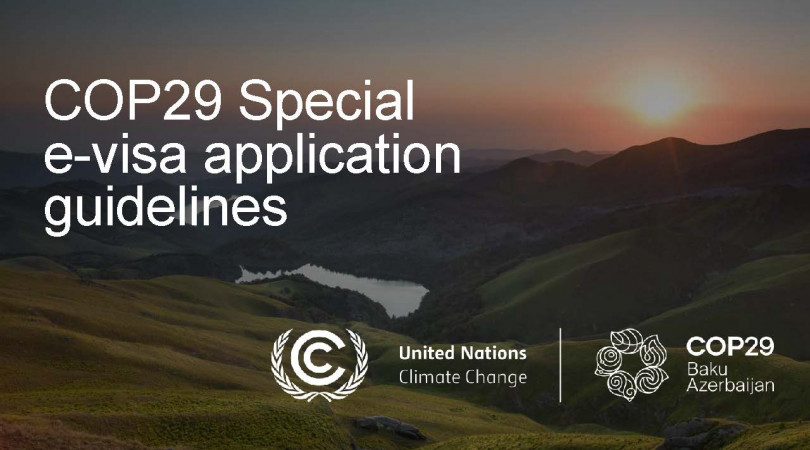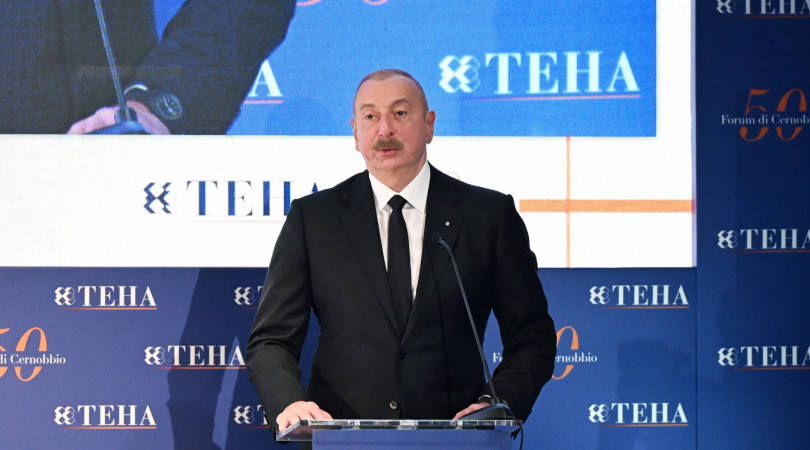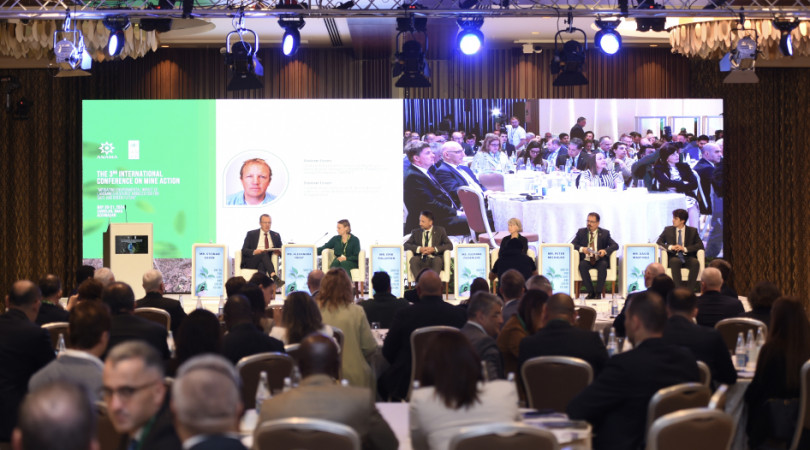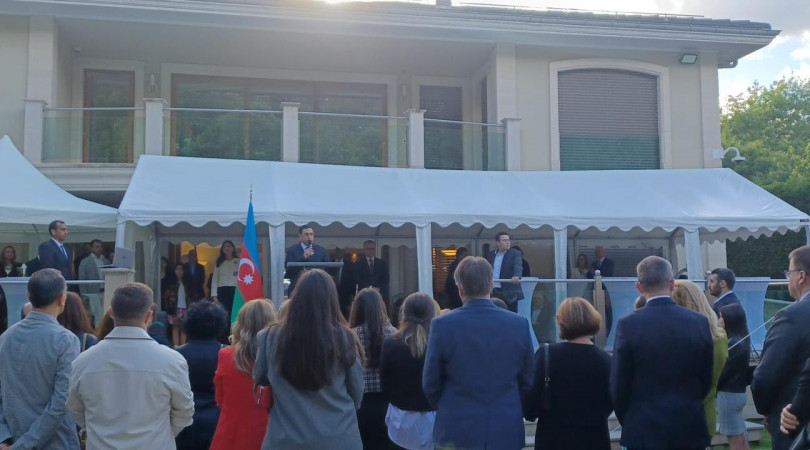COOPERATION WITH INTERNATIONAL ORGANIZATIONS
General information
United Nations and Azerbaijan
Cooperation between the Republic of Azerbaijan and the United Nations was established soon after the collapse of the Soviet Union and after Azerbaijan restored its independence.
The Republic of Azerbaijan was admitted into the United Nations on March 2, 1992 and the Permanent Mission of the Republic of Azerbaijan to the United Nations was opened in New-York on May 6, 1992. Beginning from the very first day of the cooperation with the United Nations Azerbaijan used the platform of the United Nations to draw the international community's attention to the Armenian-Azerbaijan conflict and use United Nations potential for its peaceful settlement. During 1993 the UN Security Council adopted four resolutions 822, 853, 874 and 884 on the Armenian-Azerbaijan conflict. Each of the abovementioned resolutions was adopted following the subsequent occupation of Nagorny Karabakh region and other territories of the Republic of Azerbaijan by the Armenian armed forces. These resolutions reaffirmed the territorial integrity of Azerbaijan, demanded immediate cease-fire, suspension of hostilities and withdrawal of all occupying forces from the territory of the Republic of Azerbaijan. Regrettably, the provisions of the resolutions have still not been implemented.
Expressing with great concern that the humanitarian situation in Azerbaijan continued to deteriorate seriously and the number of refugees and internally displaced persons (IDP) in Azerbaijan exceeded 1 million, in 1993 at its 85th plenary meeting the UN General Assembly adopted resolution "Emergency international assistance to refugees and displaced persons in Azerbaijan" (A/RES/48/114).
During the period 1992 to 1996 the UN Secretary-General and the President of the Security Council made several statements on the conflict confirming the territorial integrity and sovereignty of the Republic of Azerbaijan and supporting the OSCE Minsk Group's efforts towards its peaceful settlement.
Since 1996 the UN General Assembly in its resolution "Cooperation between United Nations and Organization for Security and Cooperation in Europe (OSCE)" reaffirms territorial integrity of Azerbaijan ("the conflict in and around the Nagorny Karabakh region of the Republic of Azerbaijan").
Azerbaijan takes an active part in the work of the UN General Assembly. In 1994 and 1995 at the 49th and 50th sessions of the UN General Assembly President of the Republic of Azerbaijan Heydar Aliyev headed the Delegation of the Republic of Azerbaijan. In September 2000 he also joined the work of the UN Millennium Summit and delivered a speech highlighting security and globalization problems, emphasizing the Azerbaijan's contribution to the positive development of globalization as well as security issues in the South Caucasus. In September 2003 then Premier Minister Ilham Aliyev addressed the 58th session of the UNGA focusing on regional and international security threats and the national socio-economic development.
Azerbaijan maintains cooperation with a wide range of specialized UN agencies and bodies in a very active and effective manner - UNDP, UNICEF, UNHCR, UNESCO, UNCTAD, IAEA and etc.
The cooperation between Azerbaijan and the United Nations Children's Fund (UNICEF) is focused on the alleviation of the conditions for children and teenagers among the refugees and IDPs. Azerbaijan was a member of the Executive Board of UNICEF for the terms 1995-1997, 1998-2000.
Azerbaijan has been actively participating in the work of other various UN bodies and agencies. Azerbaijan was a member of the Commission of the Status of Women (2000-2002). Azerbaijan is also a main sponsor of the Commission's annual resolution "Release of women and children taken hostage, including those subsequently imprisoned, in armed conflicts".
The Republic of Azerbaijan has special links with appropriate UN agencies and bodies such as the United Nations Development Programme (UNDP) and the United Nations Industry Development Organization (UNIDO). Different projects and programmes aimed at improving living standards, structural adjustments of economy are carried out in close cooperation with them.
Particularly, UNDP has provided extensive support to the process of post-conflict rehabilitation by funding and developing the capacity of the Azerbaijan Rehabilitation and Reconstruction Agency (ARRA) and the Azerbaijan National Agency for Mine Action (ANAMA). UNDP support to ARRA has facilitated the effective coordination of work in the sector by the World Bank, UNDP, the United Nations High Commissioner for Refugees (UNHCR), the European Union (EU) Technical Assistance to the Commonwealth of Independent States (TACIS) programme and others.
Azerbaijan views the transformation of its economic and political system as a high priority in its efforts to bring the country more in line with modern norms and standards. An important part of this process is the strengthening of democratic infrastructures, greater transparency and public participation in political debates and decision-making processes. To create employment and stimulate the economy UNDP help the Government of Azerbaijan to address those institutional and policy issues most critical to the effective development and growth of private sector. In an effort to deepen structural reforms, UNDP works closely with the World Bank on a public-sector reform programme in Azerbaijan.
As a result of Armenian aggression, there are about 1 million refugees and internally displaced persons in Azerbaijan. Since 1993 the government of the Republic of Azerbaijan and the United Nations High Commissioner for Refugees (UNHCR) closely work to alleviate the conditions of refugees and IDPs.
Taking into account the critical importance of the education, science and cultural issues Azerbaijan practices a large-scale cooperation with the United Nations Education, Science and Cultural Organization (UNESCO) and for this purpose in 1994 according to the President Decree Azerbaijan established National Committee for UNESCO.
Different Ministries and Agencies of Azerbaijan cooperate directly with their appropriate partners within the UN system (for example, Ministry of Health and World Health Organization).
The Republic of Azerbaijan is a co-sponsor of a number of resolutions adopted by the UN General Assembly and other UN bodies. The National Delegation put forward its own resolutions. Thus, the Delegation of Azerbaijan initiated the resolution "missing persons" at the 58-60th sessions of the United Nations Commission on Human Rights (CHR). The provisions of this resolution adopted by CHR are based on the well-known rules of international humanitarian law and draw attention to an important issue which, in opinion of Azerbaijan is not given due attention and consideration at the international for a.
Azerbaijan actively takes part in election process by nominating its representatives to the appropriate UN agencies and bodies. As it was mentioned, Azerbaijan was a member of Executive Board of UNICEF for the terms 1995-1997 and 1998-2000, the Commission of the Status of Women in 2000-2002, the Committee on Sustainable Development in 2002-2004. Azerbaijan was elected a member of ECOSOC for the period of 2003-2005.
Past three years due to the increased attention of the international community and the UN particularly to the counter-terrorism activity, Azerbaijan makes its own contribution to the global campaign against terror. In the UN framework, Azerbaijan actively cooperates with the UNSC Counter-Terrorism Committee (CTC) and has submitted three national reports (S/2001/1325, S/2002/1022, S/2003/1085).
Azerbaijan recognizes a vital role of the United Nations, first of all, in establishing and maintaining international peace and security, as well as in sustainable development and democratization. Azerbaijan supports the idea of the reform within the UN so as the Organization will be able to tackle with problems and challenges of the Twenty-first century.
In October 2011, Azerbaijan was elected a non-permanent member of the Security Council of the United Nations for the first time in its short history. The election of the Republic of Azerbaijan to the UN Security Council through the votes of 155 member countries was clear and obvious indicator of the respect Azerbaijan has earned globally and recognition of our contribution to global security. During its chairmanships at the UN Security Council in May 2012 and in October 2013 Azerbaijan continued to uphold the norms and principles of international law and the common justice at the international relations as a whole. Azerbaijan completed its membership of the UNSC in December 2013.
Human rightsThe Constitution adopted on November 12, 1995 set the beginning of a new era of state-building which bases on the maintenance of basic human rights. The provision of human rights and freedoms is proclaimed as a highest goal of the State in the Constitution of the Republic of Azerbaijan. The third chapter of the document titled “Fundamental rights and freedoms of a person and citizen” is composed of 48 articles which encompasses broad spectrum of human rights. Azerbaijan is a party to the fundamental international legal documents in the field of human rights. According to Article 148 of the Constitution, the international treaties, to which Azerbaijan is a party, constitute an inalienable integral part of Azerbaijan’s legislative system. According to Article 151 of the Constitution, in case of a possible contradiction between normative legal acts (except Constitution and acts adopted by referendum) of Azerbaijan on the one hand, and those international treaties to which Azerbaijan is a party, on the other hand, the norms of the international treaties shall apply. Human rights and freedoms have direct force in the territory of the Republic of Azerbaijan.
On February 22, 1998 The President of the Republic of Azerbaijan issued a decree “On the measures regarding maintenance of human rights and freedoms of a person and citizen”. With the Presidential order dated to June 18, 1998 the State Program on the protection of human rights was approved. On the basis of the abovementioned State Program Ombudsman institution was established in 2002.
In recent years the Republic of Azerbaijan has carried-out huge reforms in different spheres of social life. Steps taken with the purpose of adapting the legal system of Azerbaijan to international standards envisaged in the European Convention on Human Rights and other international documents hold important place among the reforms in the field of democratization of the country. The adoption of different laws and codes brought great importance to the strengthening of the legislative basis of the Republic of Azerbaijan.
On 1993 moratorium was declared on the execution of death penalty, and on February 10, 1998 the death penalty was abolished in the Republic of Azerbaijan.
With the Presidential order in Azerbaijan, firstly in the whole former USSR region, detention centres that had been subordinate to Ministry of Interior were subjected to the Ministry of Justice.
One of the main steps with regard to maintaining respect for human rights was the adoption of National Action Plan on the Protection of Human Rights. The National Action Plan that developed on the proposals by different governmental bodies, including the Ministry of Foreign Affairs, was approved by the President Ilham Aliyev’s order number 1889, dated December 28, 2006.
On 27 December, 2011 the National Action Programme on raising the efficiency of human rights protection in the Republic of Azerbaijan, was approved by the President. This Programme covers the issues mainly reflected in the recommendations addressed to Azerbaijan in course of consideration of its first UN Human Rights Council (HRC) Universal Periodic Review (UPR) report. The Action Programme envisages such issues as improvement of the normative-legal basis (including through definition of human rights and fundamental freedoms as a major criteria for drafting laws), improvement of activities of the state agencies, increasing transparency, training, research and awareness-raising measures on human rights, as well as cooperation with different international organizations in the field of human rights.
Along with accession to different international documents in human rights sphere, Azerbaijan also cooperates with a number of international organizations for this purpose. Different organizations of UN, OSCE, Council of Europe, and European Union are of special importance among them.
Azerbaijan effectively cooperates with UN High Commissioner for Human Rights in the field of protection and promotion of human rights. This cooperation is based on the technical cooperation document titled “Strengthening Capacities and Infrastructure for the Protection and Promotion of Human Rights in Azerbaijan” which had initially been signed in 1998, and which envisaged cooperation till 2000. Taking into account the importance of the issue a new Project document was signed between Azerbaijan Government and the Office on December 2001. Within the framework of the project different events (seminars, trainings, exchange of experience, publication of materials etc.) in the field of human rights were organized. The Ministry of Justice was the coordinator on behalf of Azerbaijani Government. One of the main achievements of Azerbaijan in the field human rights was the election of Azerbaijan in 2006 to the membership of newly established HRC. According to the UN General Assembly resolution A/60/L.48 UN General Assembly’s subsidiary body – HRC was established and that substituted Human Rights Commission. Azerbaijan was among the 47 member-states that became the first members of HRC. HRC started functioning on June 19, 2006.
The Government of the Republic of Azerbaijan has submitted Interim report to the Office of UN High Commissioner for Human Rights (OHCHR) and HRC in 2012. This Interim report covered the issues reflected in the recommendations addressed to Azerbaijan in course of consideration of its first UN HRC UPR report. Furthermore, OHCHR and HRC have been constantly informed on the measures taken with regard to the recommendations addressed to Azerbaijan during the consideration of its first UPR report.
The Republic of Azerbaijan conducts an ongoing fruitful cooperation with the Special Procedures of the HRC. The Government of Azerbaijan has been receiving all Mandate Holders under the UN Special Procedures, which sent letters requesting to visit the country. It should be also highlighted that in April 2013 the Government of Azerbaijan has sent a standing invitation to the special procedures mandate holders.
On 16-23 May 2012, A.Grover, the UN Special Rapporteur on the right of everyone to the enjoyment of the highest attainable standard of physical and mental health visited Azerbaijan.
On 30 April 2013, an interactive dialogue on the situation of human rights in Azerbaijan was held within the 16th session of UPR Working Group. During an interactive dialogue 77 states has delivered a speech and made recommendations with regard to situation of human rights in Azerbaijan. The measures taken by the Government of Azerbaijan in the field of human rights and freedoms, as well as the positive developments and some difficulties were highlighted during event.
The third periodic report of the Republic of Azerbaijan under the International Covenant on Economic, Social and Cultural Rights was considered on 3rd May 2013 within the 50th session of the Committee on Economic, Social and Cultural Rights in Geneva. The Committee members highly evaluated the high level of the Delegation, the opening statement of the Head of Delegation and the measures taken in the field of realizing the economic, social and cultural rights comprehensively reflected in the report. In this regard, the Committee members considered the very issues as good examples of the efforts of the Government of the Republic of Azerbaijan in the field of the provision of economic, social and cultural rights. The third periodic report of the Republic of Azerbaijan and the process of interactive dialogue were highly appreciated by the Committee members. It was mentioned that the efforts of the Republic of Azerbaijan on the implementation of the International Covenant on Economic, Social and Cultural Rights was noteworthy.
On 20 September 2013, the meeting was held in connection with the adoption of the report of the Working Group on UPR of the Republic of Azerbaijan within the framework of the 24th session of the UN HRC. 158 recommendations out of 162 submitted in total within the framework of the review fully or partially accepted by the Government of the Republic of Azerbaijan, the certain part of these recommendations had already been implemented and the other remaining recommendations were at the stage of realization. At the end of the meeting, the Report of the Working Group on the Universal Periodic Review of the Republic of Azerbaijan (A/HRC/24/13) was adopted by the HRC unanimously.
On 26 November-6 December 2013, R.Manjoo, the UN Special Rapporteur on violence against women its causes and consequences has visited Azerbaijan. In the Annex of her report to the 26th session of UN HRC mentioned that Nagorno Karabakh is a part of the Republic of Azerbaijan and referred to the relevant UN General Assembly and Security Council resolutions with respect to conflict. Moreover, in her report Special Rapporteur made a following recommendation: "the Special Rapporteur further recommends that the international community intensify efforts aimed at the speedy resolution of the issue of the occupation of land, in accordance with the norms and principles of international law and the provisions stipulated in GA resolution 62/243" which is "The situation in the occupied territories of Azerbaijan" ".
Mr. Murad N. Najafbayli, Ambassador, Permanent Representative of Azerbaijan to the United Nations Office and other international organizations in Geneva addressed a letter to the President of UN HRC with regard to violations of ceasefire regime by the Armed Forces of the Republic of Armenia. The mentioned letter was distributed as an official document of 25th session of UN HRC (A/HRC/25/G/5).
Mr. Murad N. Najafbayli, Ambassador, Permanent Representative of Azerbaijan to the United Nations Office and other international organizations in Geneva addressed a letter to the President of UN HRC with regard to the commemoration of twenty-second anniversary of Khojaly Genoside. The mentioned letter was distributed as an official document of 25thsession of UN HRC (A/HRC/25/G/14).
The initial Report of the Republic of Azerbaijan on the implementation of its obligations under the UN Convention on the Rights of Persons with Disabilities was considered on 1-2 April 2014 within the 11th session of UN Committee on the Rights of Persons with Disabilities in Geneva, and the concluding observations was adopted. Azerbaijan was represented with the delegation headed by the Minister of Labour and Social Protection of the Population. The Committee commended the Republic of Azerbaijan for its efforts to improve its legislation, particularly the adoption of Law on Amendments to the Criminal Code of the Republic of Azerbaijan of 31 May 2011, as well as for initiating programmes on the rights of persons with disabilities, such as the State Programme on De-Institutionalization and Alternative Care 2006-2015 and the State Programme on Inclusive Education. The Committee further commended our country for establishing a working group under the Ministry of Labour and Social Protection of Population consisting of representatives from relevant government agencies and non-governmental organizations of persons with disabilities, which is mandated to coordinate the implementation of the provisions of the Convention in Azerbaijan. The Committee also welcomed the country for its role in cooperating with other States parties in the region on issues under the Convention. Besides, the proposal of the Committee on the option of submitting the next periodic reports under the Committee’s simplified reporting procedure has been considered acceptable and the Government of the Republic of Azerbaijan has decided to join to the simplified reporting procedure.
The Permanent Mission of the Republic of Azerbaijan to the United Nations Office and other international organizations in Geneva continues its contacts with the international non-governmental organizations dealing with issues of refugees and internally displaced persons (IDPs) in order to bring the issue of situation of refugees and IDPs of Azerbaijan to the attention of international community. On 26 March 2014 the Internal Displacement Monitoring Centre (IDMC) has published a report on Azerbaijan. The report highlights the following key points: root cause for the IDPs in Azerbaijan is the conflict between Armenia and Azerbaijan; Armenia controls Nagorno Karabakh and 7 adjacent districts; the territories that lived IDPs were occupied by Armenian Armed Forces; conflict is ongoing through the line of contact.
On 18-24 May 2014, C.Beyani, the UN Special Rapporteur on the human rights of internally displaced persons has visited Azerbaijan. Special Rapporteur will present his full report to the June 2015 session of UN HRC.
The members of UN Human Rights Council Working Group on Business and Human Rights, and UN Subcommitte on Prevention of Torture and Other Cruel, Inhuman or Degrading Treatment or Punishment (SPT) will pay their first ever official visits to the Republic of Azerbaijan on 18-27 August 2014 and 8-17 September 2014, respectively.
Human Rights Council
Letter dated 24 July 2013 from the Permanent Representative of the Republic of Azerbaijan to the United Nations Office and other international organizations inGeneva addressed to the President of the Human Rights Council
Humanitarian affairsInternational Committee of the Red Cross
The ICRC has been working in Azerbaijan since 1992 in relation to the aggression of the Republic of Armenia against Azerbaijan. It focuses on the issue of missing persons and on detainees held for conflict-related or security reasons, and works to protect and assist communities living along the Line of Contact and the international border with Armenia. It promotes implementation of IHL and its integration into armed and security forces’ training and into academic curricula. The ICRC works in partnership with and aims to help strengthen the capacities of the Red Crescent Society of Azerbaijan.
In partnership with the Red Crescent Society of Azerbaijan and the British Red Cross, the ICRC continued to implement activities to help people living in villages along the Line of Contact and the international border become resilient and self-sufficient. These included improving their access to water for drinking and irrigation, providing them with livelihood opportunities, and affording them better protection against exchanges of crossborder fire through home repairs.
Resolving the fate of people who went missing during the conflict remained a priority. The ICRC assisted the Azerbaijani State Commission on Prisoners of War, Hostages and Missing Persons (CEPOD) in setting up and managing a centralized system for ante-mortem data collected from the families of missing persons, providing technical support throughout the process.
National Society/ICRC teams and the Azerbaijan National Agency for Mine Action (ANAMA) continued to collect data on minerelated incidents and the needs of families who had lost breadwinners in such incidents. In accordance of ICRC information, 12 households (50 people) in Azerbaijan who had lost their breadwinners in mine/ERW incidents boosted their income or food production through livestock activities, aided by productive inputs.
Issues related to missing persons are important for Azerbaijan. There are 4046 missing persons in Azerbaijan. With local partners, the ICRC continued to provide comprehensive support for the psychosocial needs of families of missing persons while encouraging the authorities to enforce their right to free medical care and other benefits.
Permanent Mission of Azerbaijan in Geneva continues its regular work and activities with ICRC. In that regard, as a result of intensive interaction carried out with ICRC at Geneva, the historical names of different locations in the Nagorno Karabakh region of the Republic of Azerbaijan (Aghdara, Khojavand and etc.) were also mentioned in the relevant reports of this institution. At the same time, new map with regard to the administrative territory of Azerbaijan was prepared by ICRC, whereby the occupied territories of Azerbaijan were highlighted through special signs.
International Civil Defence Organisation
Azerbaijan is a member of International Civil Defence Organisation since 1993. The Ministry of Emergency Situations of the Republic of Azerbaijan is closely cooperation with it. Azerbaijan was unanimously elected as a member of the Executive Committee of this organization for the years of 2015-2018.
United Nations International Strategy for Disaster Risk Reduction
Azerbaijan is also closely cooperating with UNISDR (United Nations International Strategy for Disaster Risk Reduction). In May of 2013, Permanent Mission participated at the 4th Global Forum on Disaster Risk Reduction organized by UNISDR in Geneva.
Statements
Office of United Nations High Commissioner for Refugees
Office for Coordination of Humanitarian Affairs
Economic and Social Council
International Organization for Migration
Speech by the Permanent Mission at the 101th session of the Council of IOM
International Civil Defence Organization
Other events
Economic issues


















